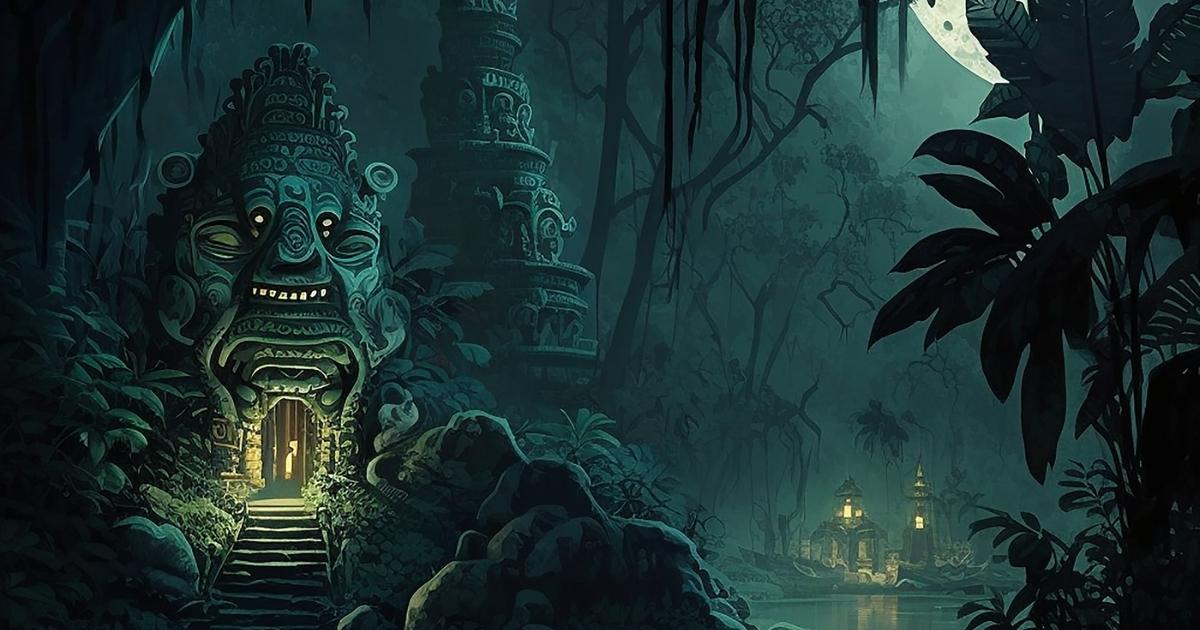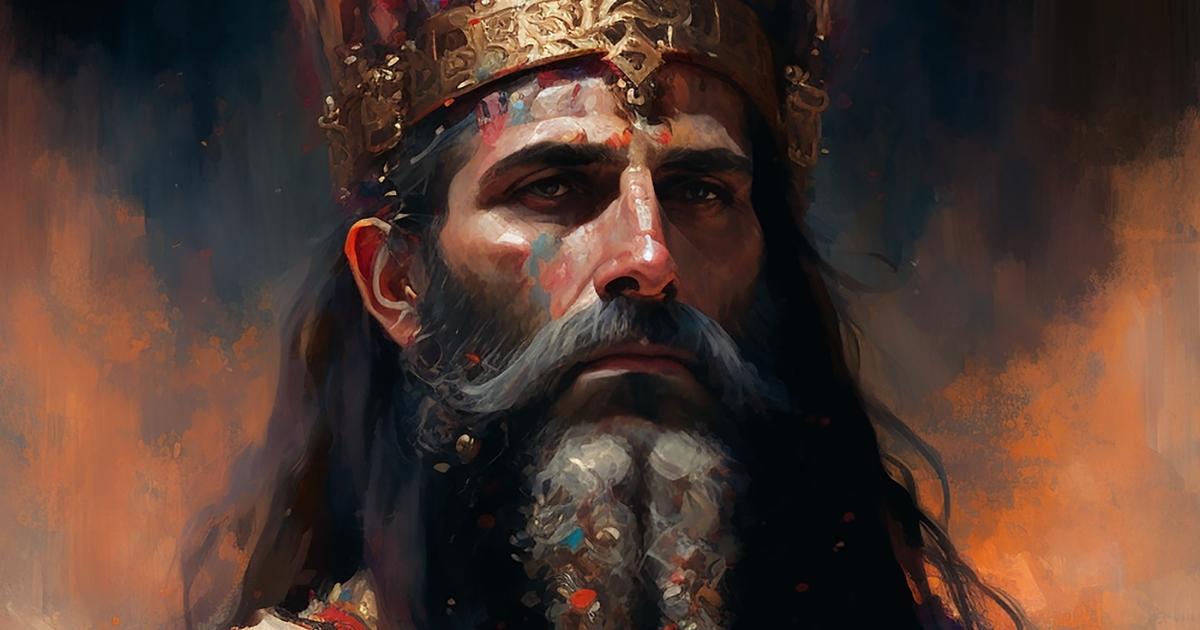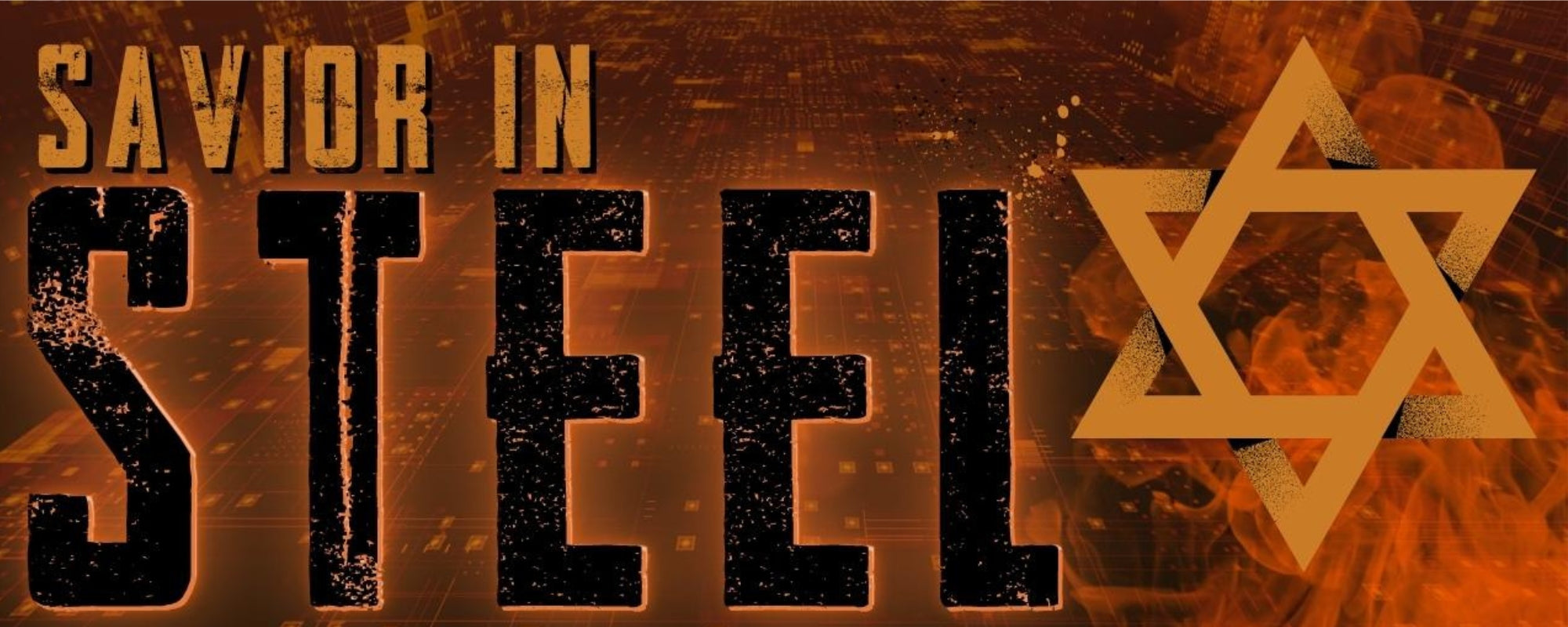
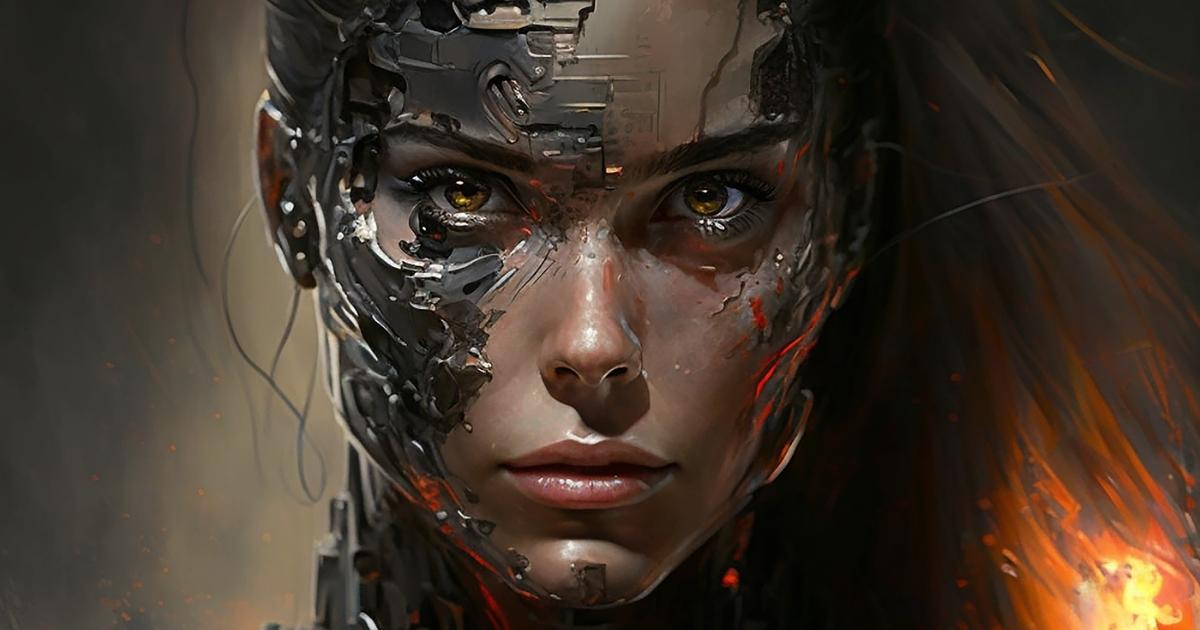
Savior in Steel
By Zachary Rosenberg
My people once shaped golems from stone and clay. Now we make one cast in steel. She lies before us, silver in color, save for the golden Star of David on her chest.
I congratulate my husband as he finishes the adjustments to our creation’s resting place, lowering the slab so I might take a closer look at her. “Good work, Yitzhak.” Dragon-smoke flares of neon curl and bleed in through the windows, brushing against our golem’s body. Triumph overcomes my weariness, smile tight across my face.
“Thanks, Miriam. But you did the important part,” Yitzhak answers, his thin smile highlighting the premature wrinkles on his face. He is staring down reverently at our creation, tears brimming in his eyes.
“Nobody achieves anything alone,” I remind him, catching myself staring at him and remembering the days when our marriage was whole. I pat our child’s steel shoulder. “Hard part’s over. Hopefully we have enough time to finish the rest.”
“Do you think we’re safe?” he whispers, trepidation clear in every syllable.
“Of course not,” I scoff. Our sanctum is set deep within the Earth, a gaping wound in a world of jutting skyscrapers where once the synagogue stood. We are in the lowest levels, in a makeshift laboratory, guarded from above. True safety is a luxury we left behind long ago. “If you’re going to run, do it now.”
I feel his hesitation, the slight tremors of fear in his voice as he commits to bravery. We Jews hold to our culture even with the threat of annihilation. We hide from roving patrols and present as lawful citizens by day, but never have we stopped resisting.
Yitzhak stands with me, no matter how afraid he is. “I would never leave you, no matter what.”
“I know.” Divorced or not, we’re still friends, and he’s dedicated to the cause. Yitzhak’s integrity is beyond compare. “Look. She’s awake.”
I’ve created life, sparked consciousness into being. She is my marvel, my defender, my Tzeidel. “Her mind is active.” I tap my forehead. “I’ve used my implants to link our thoughts together. It’ll take a few minutes, but I’ll have Tzeidel’s mind and body at full functionality.”
Her name is the same as the daughter we lost years ago. Her features are a manufactured blend: my small nose and high cheekbones; Yitzhak’s thin lips and strong chin.
I reach out a hand to feel that face, taking in every detail. Even with that neon mist, the silver veins in my dark arm pulse, displaying the implanted links that blur the line between human and machine.
“Now the rest, Miriam,” Yitzhak reminds me, as he’s done a hundred times.
As she lies before us, Tzeidel is awake. Hers is an artificial intelligence modeled after my own brain patterns, flying through years of life and development in seconds. A very specific linkage of the chips and neurons in her head mingled with downloads from my implants to deliver consciousness. “I know. We’re only done after she’s up and killing the people who deserve it.” I sound impatient, but I’ve been awake for days. It takes time to layer wires through such a large body and get them to convey electrical signals in the same way my body carries blood. It takes even longer to incorporate military-grade hacking technology and regenerative properties. I am a scientist, a surgeon to machines. It is my profession and my art that I apply to my new daughter now.
✡
I use my implants to enhance my vision, so that I might see within each metallic pore of my awakening Tzeidel. She stares back at me with eyes of crystal, optical nerves dark with disuse. “They might be here soon, Tzeidel.”
Who are ‘they,’ Mother?
Tzeidel speaks in my mind, heard by only me through the connection I’ve established via my implants. Our minds are linked together, feeding her information and functionality. She sees through my eyes, reads my thoughts, but she is not yet mobile. I expected this, but it still gives me pause. Hearing the remembered voice of my dead child is like muffled syllables after a long drone of static. Tzeidel’s voice is childlike, gentle. She does not yet understand violence, nor the need for it.
I’m so sorry that I’ll have to change that.
“They” is the word Yitzhak used. It’s a word that encompasses all the terror and menace in the world. I wonder why he’s not honest about this ‘they,’ giving them proper names and categorizing them not as fairy-tale creatures, but flesh-and-blood despots.
Our oppressors, I say, feeding her the information while I work. My brain is teaching hers how to speak, move, and function, gifting her knowledge and history. I tell her of our people, thought after thought entering her mind as she waits, docile, to fully live. The ones who say our people have no place in this world. They tried to take our culture from us, forced these implants into our bodies to change us. All so we might better perform our tasks, whether enhancing our strength for manual labor or sharpening our mental acuity for less mundane tasks. It will be on you to bring them down. You’re not invincible, but the distinction to them will be irrelevant. Bullets and blows will not work against her. Chemicals are meaningless. Nuclear bombs, acid, maybe pure disintegration would destroy her, but those seem in short supply here.
It is almost time for her rise. Maybe she can make a difference, rally disparate factions, allow other cells to duplicate her so numbers make such weaknesses irrelevant. An uprising of steel saviors to turn the tide against the regime and take our lives back. I must believe it is possible.
“Miri?”
“Working fast as I can, Yitz.” I adjust the wires, wielding my tools with precision. Tzeidel’s limbs are welded perfectly to the torso, digits to limbs, and a fully designed nervous system will allow them to function upon awakening.
“She doesn’t feel any pain, does she?” Yitzhak hovers over my shoulder, reminding me of the days when I observed Tzeidel’s namesake in her sickbed, body withering from her rejected implants. I remind myself how hard it must be for Yitzhak to see her now. I wish I could temper haste with compassion.
What is pain, Mother? Tzeidel sounds so innocent.
When you feel the opposite of how you want to. It’s the best answer I have.
“It’s just taking a while to build her mind, Yitz. There’s a lot to show her.”
Tzeidel, my golem, my daughter. Her namesake was one of many whose body reacted badly to the implants, jerking from electrical pulses beneath blackening skin. My final memory of her is a three-foot shape beneath a pale sheet. I recall the vaguest outline of her features against the cloth, vermillion sign pulsing above her to mark her for cremation. The face now before me is shaped into the nearest approximation of what I can only imagine my child would look like if she’d been allowed to grow into adulthood.
I cannot remember her face anymore. I recall the scent of her hair, the softness of her skin. Like me, she was a Mizrahi Jew, dark-skinned and dark-eyed, I know that much. But I no longer have a photograph to recall her by. “Rejects” like her were erased, any hint of their memories deleted from every available record so that we may not know their weakness. My girl became nothing but disparate flecks of scattered data, her face lost in the mist of memory.
She smiled often. I remember that much. I wish I could remember her as vividly as I do the Rabbi who tried to mourn her for me. His face remains fixed in my mind, splashed in blood from the beating he was given.
All I did was watch. But never did I forget.
“She’s really incredible.” Yitzhak’s breath warms the back of my neck, wonder, nostalgia and grief soaking his words.
Will the others think so, Mother? Tzeidel sees Yitzhak’s face through my mind and memories. She sounds so delicately shy now. Do you think I’m beautiful?
I touch the Star of David on her chest.
Beyond words, Tzeidel. All the more beautiful for what you will create.
Looking upon her, I can afford this smile, a vestigial remnant of human feeling. Such emotion is as obsolete in this cityscape as freedom or religion. But all of them may yet be found in this hollowed-out wound if one knows where to look. “She’ll be so strong,” I say. Her cheek is cold to the touch. “She’s not finished yet, though.”
What else do I need, Mother? I want to help. Tzeidel’s voice is eager.
You have to hate. Love and peace can’t save our world, Tzeidel. It cannot stop tyranny. You have to hate oppression. You have to fight.
But how? Tzeidel sounds afraid. Even the memories I show her are not enough. I don’t want to disappoint you.
“Miriam, is she okay?” Yitzhak asks. He is nervous, and I can tell he is looking back to the entrance. Each night we are here, we risk discovery and the label of obsolescence. Each night, we take our lives within our hands. We hurry here from the scrap yards and junk heaps, scavengers gnawing at the carbonized bones of society.
“It’s not exactly a simple trick to simulate brainwaves for full mobility,” I say. My scalpel slides delicately against Tzeidel’s forehead, exposing the nervous system I built for her. A cluster of wires and microchips greets me, a perfect network to link thought patterns and brainwaves. “I’m going to need to imprint more of my own. It will give her all my memories, my entire life. You understand, Tzeidel?” I hope she does. I’m not sure I have the emotional strength to do this without her consent.
There is hesitation, but also excitement. It is the delighted tone of a child wanting to be of service. If it will help, Mother. I’ll do it.
Yitzhak grabs my shoulder, interrupting my work. “That’s never been done before. Miriam. If anything goes slightly wrong, you could burn yourself out. You’d be…” He stops.
“Like a latke left in the fryer too long?” Humor is quite the effective tool when nothing else remains. I am not as fearless as I pretend. I wear the gold star always, but it is heritage and defiance rather than faith that led me to slit my chest open and sew that symbol close to my heart. I feel it there with each pulsing beat, every breath a reminder of what this system has taken from me. “Maybe that’d be a blessing, Yitz. I wouldn’t have to remember everything.”
I know his face as well as I do my own. It has been a long time since I saw him smile. He tries to remain stoic, but a subtle spasm of pain passes over him. “Even me?”
“You know that’s not what I meant.” I can’t argue with him now. He has to understand. “Don’t all miracles carry some risk? Didn’t you first teach me about the golem?”
A legend of our people from so long ago, a Rabbi of Prague shaped it from clay, named it his daughter, and festooned the forehead with the golden letters emeth—truth in Hebrew. He set it upon the enemies of the Jews, forcing concessions from the city. Then he returned his child to clay as the price for that capitulation. The golem is the protector of our people, once wrought of clay and stone. Today, we shape it from silicone and steel.
The records said that he named his child Tzeidel—Princess. My faith is lacking, but coincidence is ever a strange visitor when it taps at the door.
He doesn’t protest further. No pleas for me to reconsider. Yitzhak was always so good at doing what I asked.
“You brought me into this, Miri.” His hand clutches tight on my shoulder. He squeezes reassuringly before releasing me. “If not for you, I may never have found the courage to fight back.”
I return to Tziedel and delicately probe into my daughter’s brain, fitting links together. She’s so brave—stalwart and true in her acceptance. The core of her brain is a chip I stole from the hospital, and a binding agent that can read and detect neuro-signals from the broadcasts all around us, and even from within the heads of others. Tzeidel will know power beyond comparison.
The implants burn beneath my skin, molten mercury sizzling within my veins as I push my vision to its utmost limits. I ignore the strain in my ocular nerves, though I risk the rupture of my capillaries.
I connect the wires, linking them strand by strand, every angstrom absolutely perfect. I am crafting life. I cannot afford for a single thing to be wrong. “How does she look now, Yitz?” I slide Tzeidel’s cranium shut and weld the metal back together without scarring her chrome perfection.
Tzeidel is silent. Her mind must be so overwhelmed she cannot talk, too busy sifting through new images and brainwaves. I urge her to fight, to find her motivation and liberate herself.
“Strength, Miri.” Yitzahk’s touch is so familiar, yet so alien all at once.
“I’m strong, Yitz.” A lie. I’m so tired of fighting and resisting. Exhaustion courses through me like the visible silver in my veins. I fight on because I must. Because I am a Jew. It is something that no one has taken from me despite their best efforts. Not everyone in this resistance is one of my tribe, but we find common cause in declaring, “No more.”
“Miriam! Yitzhak! They’ll be here soon!” The voice carries a note of panic from upstairs. I ignore them, hunched over my daughter of metal. Maybe we are discovered or betrayed. I don’t know. I must finish; if they find and destroy Tzeidel, years of work are for naught. Death, erasure, obliteration do not scare me after so long. Only failure.
So like Devorah, like Yael, like all the great women of our Tribe, I will triumph.
To write in Hebrew is a crime punishable by the complete erasure of personality, and with no small thrill do I carve the letters into Tzeidel’s forehead:
Emeth.
Truth.
The animating word of the golem in legend. But the stories are just that, and the great body before me does not stir, nor twitch. She is as placid as an embalmed corpse.
I activate my implants and plunge deeper into Tzeidel’s mind than ever before, and it is here that I begin a new upload. Even miracles need a little help. My thoughts coalesce, the chips and wires within me converting my brainwaves into energy and broadcasting them to be received and duplicated by the designed net within my daughter’s chrome skull. I begin the process of bringing her fully to life, teaching her body how to move. My life flashes before my eyes. My subconscious and conscious thoughts merge as data to enter Tzeidel’s mind. I show her my childhood as a young immigrant, my first day attending a university engineering class.
I see the first day I met Yitzhak at the school cafeteria, so shy behind his textbook. It was a shield for his reddened face when he caught me smiling at him. How young we were then, how joyous and faithful, till the day the regime announced its formation and we held one another’s hands as though we were anchors in the storm of uncertainty. He and our Tzeidel were my lighthouse, my guiding lights in a dark morass. I was useful to the regime, and so they used me to design, to engineer.
To implant.
I remember the operation on my daughter, my quiet assurance to her that everything would be okay. I’ve broken so many promises since then, but none have anguished me more. I could not even say a Kaddish for her, the prayer of mourning and remembrance. I simply let the star grind to my heart with every beat, not one breath passing without her memory. I show her oppression, pain, the necessity for why violence must be the response.
“Miriam, they’re coming!” Yitzhak now. I hear guns upstairs, roars of defiance. I center my attention intently on Tzeidel, letting my thoughts flow into her, one by one. I copy my brainwaves into the golem, Yitzakh breathing harder behind me. “You have to hurry.”
I want to hurry, but all I can do is wait for the transfer. Our allies above know the risks. Their lives are currency, paid as the ultimate price for the sweet potential of liberation. I honor their sacrifices in my heart. I am so tired of running and fighting, weary in mind and body alike. I just need time to show my daughter the way.
Though I try only to focus on my task, I realize the sounds of fighting upstairs have ceased. Footsteps replace the silence, act as harbinger of what must come next. “Too soon,” I murmur, the effort to speak almost insurmountable. “Yitz, I haven’t finished.”
Yitzhak joined this sect because of me, afraid all the way, but never once did he consider turning back, nor betraying us. As we worked together, our daughter’s death created a gulf between us. But in his eyes, I see that love has never died.
The door opens. Men with guns march in. “Miriam Bialik. Your judgment is liquidation.”
They raise the guns. My only weapon is dormant on the table. I do not call for defense, nor do I ask Yitzahkh to die faster for my sake.
He does so regardless.
The guns go off, and my husband’s back opens like a blossom of red flowers. An explosion of blood splatters my face. I told myself that there was nothing left to hurt in me, that my heart was steel and cybernetics, but it shatters again, all the same. He falls, but I catch no glimpse of his face, nothing I can hold onto. His features jumble into a realm of possibility, as lost to me as the visage of our daughter. It buys me seconds, but in that single instant, I hear the buzz in my ear that signals the upload is complete. I reach for the implant.
I feel impact, but no pain. I am on my back, staring at the ceiling and hearing nothing, feeling only cold leak through holes in my body. Above me, the neon light flows together, misty echoes of a dawn to come. It takes everything I have, everything I am, to smile. Yet smile I do.
Erev Tov, my love. Good morning.
Tzeidel Bialik rises from her slab.
A hand fills my vision. Metal, though the fingers are as flexible as flesh. They run down across my face, cold and chrome.
“Mother?” The voice is so soft, ragged as a torn shroud. I turn my head to see Yitzhakh lying face down, a pool of crimson spreading out from beneath him. Something wet stains my back. I am as cold as the metal of my daughter’s body.
I can see through her eyes now. Our thoughts are connected. The armed men stare at Tzeidel, the fear in their eyes the first human emotion I can ever recall glimpsing on the faces of agents of the regime.
The upload is complete, my memories and brainwaves, everything I am now held within my golem. I made her body well, unlike the lumbering stone and clay beast the legend spoke of. She is metal, yet limber and sinuous. Built for combat. Through her eyes, I see my old body, dark-skinned, hair streaked with gray, flesh chewed apart by bullets.
Seeing me, I know she understands hate at last.
The men open fire, the bullets tearing through the golem. But the wounds simply seal closed, and with a single thought, Tzeidel hacks into their implants, leaving them frozen and helpless.
I withdraw from her mind, back to my own numb body so that I may watch with human eyes. Tzeidel teaches them the wrath of the oppressed, the fury of the Jews. These men die in a symphony of fright and horror. She kills them without precision, in the name of Yitzhakh, Miriam, and Tzeidel, for our comrades and all those who have died at the hands of this regime. She is a butcher, a shochet, taking this laboratory and leaving it bloody until there is nothing left to kill.
“Mother.” Tzeidel kneels before me. “You’re dying. aren’t you?” Her metallic voice is rusted with sorrow. Any child can recognize wrongness when it rips their parents from them. Explaining hatred will always pale in comparison to hands-on experience.
I give Tzeidel the last order as a mother, a commander. She might once have balked, but now she understands. I hear it in her thoughts.
Her fingers, hooked and clawed, carve at my body’s fragile flesh. She reaches and delicately extracts the Star of David from near my slowing heart. I have little time left, and I am simply relieved for it.
She retrieves Yitzhak’s own and presses them together, back-to-back, as though honoring our old vows. She slices her own chest open and places the linked stars within before the metal can regenerate. We will reside there. Together. With her.
My daughter must grow on her own now. I knew this would come, that they would kill me eventually. It’s a necessary sacrifice to shape her into the avenger she must be.
She will leave this place and find the other resistors. Tzeidel will stalk these nights and rip down the powerful from their exalted heights. She will be the first of many, the golem perfected. Our comrades will build an army from her knowledge. They will burn the regime to nothing. I will not see it, for tonight I join the ranks of martyrs.
But they will see her face, my daughter’s face, as their ivory towers fall like Babel. I let her mourn, let myself be her sacrifice, the final key to her completion.
My Tzeidel, my golem, my daughter.
Our savior, cast in steel.
Copyright © 2023 Zachary Rosenberg
The Author
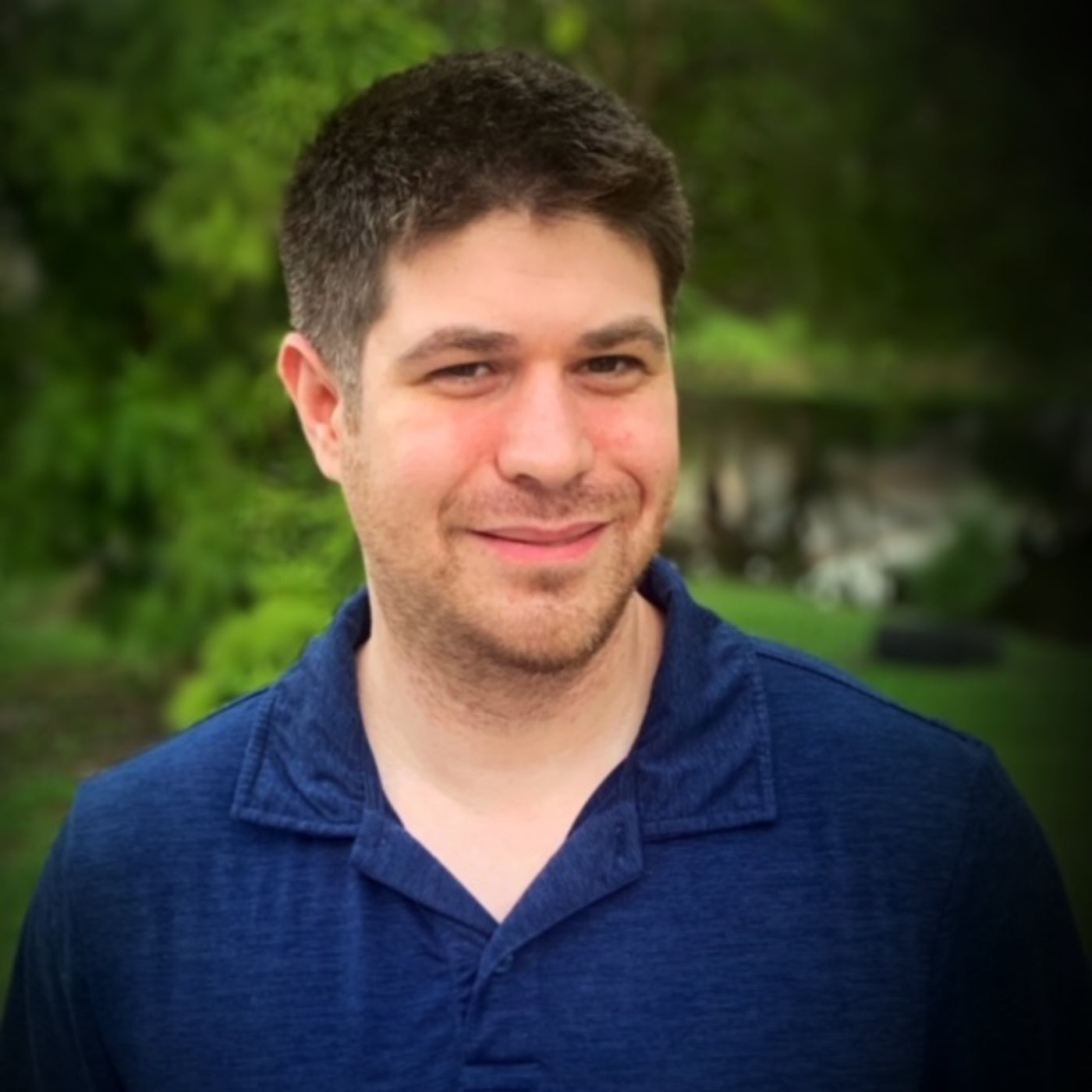
Zachary Rosenberg


